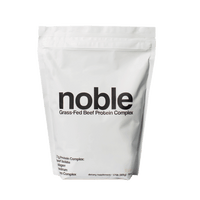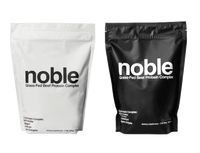
Carnivore Diet for Weight Loss (How to Shed Pounds the Primal Way)
Share
Weight loss journeys often feel like navigating a maze, with countless paths and few clear directions. But what if the primal footprints of our ancestors marked a trail?
The carnivore diet for weight loss beckons with its promise of high-protein, zero-carb simplicity. Imagine a world where every meal fuels your body and helps melt away those persistent extra pounds.
Dive deep with us as we unravel the secrets of this meat-focused regimen and discover how to harness its power for transformative weight loss.
Hungry for change? Let's embark on this savory adventure together!
Key Takeaways
- The carnivore diet can help you lose weight effortlessly by creating a caloric deficit and promoting fat loss.
- Common reasons for not losing weight on the carnivore diet include expecting quick results, consuming excess calories, lack of physical activity, and inadequate water intake.
- To successfully lose weight on the carnivore diet, maintain a caloric deficit by choosing lean cuts of meat and practicing portion control.
- Exercise and staying hydrated are crucial to your weight loss goals with any diet.
- Consider your body composition to set realistic weight loss goals.
Can You Lose Weight on the Carnivore Diet?
Yes, you can lose weight on the carnivore diet. This diet is a high-protein, low-carb plan that helps you drop pounds. The carnivore diet has more power than the keto diet. It can give up to 40 percent better results. (1)
Many meat lovers lose weight using this way of eating. You just eat meat and stop eating carbs.
Body fat goes down fast when you do that right! So, if you want to lose weight, the carnivore diet might be a good fit.
Common Reasons for Not Losing Weight on the Carnivore Diet
You've jumped into the carnivore diet, expecting to shed some pounds, but the scale isn't budging. Let's actively dive in and uncover the reasons behind this unexpected standstill.

It's too early.
Your body needs time to adjust to the new diet. Meat is slower to break down and use than a salad. (2)
This means that your body will take a while to start shedding pounds.
Hoping for quick results won’t help here. The carnivore diet does not work like magic right away. You need patience and a long-term commitment to this diet.
So, keep eating those juicy steaks, and let your body do it!
Excess caloric intake
Just eating meat does not mean you will lose weight. All foods have calories, and too many can hinder weight loss. Consuming more calories than your body needs on the carnivore diet is possible. (3)
This is one reason why people do not lose weight. The fix?
Check how many calories you eat compared to what your body uses daily. If it's too much, cut back a bit!
Lack of physical activity
Regular exercise is vital for losing weight on the Carnivore Diet. Without physical activity, simply following the diet may not lead to significant weight loss.
When you don't exercise regularly is possible, your metabolism slows down. This makes it harder for your body to burn calories and shed pounds.
Additionally, a lack of physical activity can result in muscle loss instead of fat loss, which is not ideal when trying to lose weight.
Stay active has many benefits beyond weight loss, including improved cardiovascular health and increased energy levels.
So, engage in daily physical activity while following the Carnivore Diet for optimal results!
I need to drink more water.
Not drinking sufficient water can lead to dehydration and false hunger signals, making you eat more calories than you need.
To avoid this, make sure to stay hydrated throughout the day. Drinking water before meals can help reduce calorie intake and support weight loss.
Additionally, staying hydrated can prevent overeating and curb cravings for unhealthy foods.
So remember to prioritize adequate water intake while following the Carnivore Diet for effective weight loss.
Already at a low body fat percentage
If you already have a low body fat percentage, it could be why you're not losing weight on the carnivore diet. Your body might be resisting further weight loss because it's already at a healthy level.
This can make your weight loss journey more challenging. When you have less body fat to lose, your progress may slow down, and it might take longer to see results.
So, keep going if you're not shedding pounds as quickly as others with more excess weight.
Just keep following the carnivore diet and focus on maintaining a healthy lifestyle.
Tips for Losing Weight on the Carnivore Diet
To successfully lose weight on the carnivore diet, you need to maintain a caloric deficit by consuming fewer calories than your body needs for maintenance.
Prioritizing physical activity ensures you're moving your body and burning calories.
Stay hydrated by drinking enough water throughout the day. Keep an eye on portion sizes and make sure you are not overeating.
Lastly, consider your body composition when setting weight loss goals to ensure they are realistic and attainable.

Maintaining a caloric deficit
This means consuming fewer calories than your body needs to maintain weight.
Eating a low-carbohydrate, high-protein diet like the carnivore diet can make it easier to create a caloric deficit because protein-rich foods tend to be more filling and satisfying.
To maintain a caloric deficit on the carnivore diet:
- Choose lean cuts of meat: Lean meats, such as skinless chicken breast or extra-lean ground beef, are lower in calories than fattier cuts. Opting for lean protein sources can help you stay within your calorie goals.
- Practice portion control: Pay attention to your portion sizes when eating the carnivore diet. While protein-rich foods can help you feel full, overeating can still lead to excess calorie intake. Use measuring cups or scales to ensure you're consuming an appropriate amount.
- Include nutrient-dense foods: Along with meat, incorporate nutrient-dense foods like leafy greens and non-starchy vegetables. These foods are low in calories but high in essential vitamins and minerals, helping you stay satisfied without going overboard on calories.
- Be mindful of added fats: While healthy fats are in the carnivore diet, keep track of how much fat you add to your meals. Fats are high in calories and can contribute to weight gain if consumed excessively.
- Monitor snacking habits: Snacks can add up quickly in calories, so be mindful of your snacking habits on the carnivore diet. Opt for nutrient-dense snacks like hard-boiled eggs or beef jerky if needed.
Physical activity on the Carnivore diet
Combining exercise with your carnivore diet will help your weight loss efforts. Here are some ways to get moving:
- Embrace cardio: Brisk walking, jogging, cycling, or swimming can help burn calories and increase fat loss.
- Try strength training: Lifting weights or resistance bands helps build lean muscle mass, enhancing your metabolism and aiding in weight loss.
- HIIT it up: High-intensity interval Training (HIIT) entails brief, intense exercise and recovery intervals. This type of workout is known to maximize calorie burn and fat loss.
- Get creative with bodyweight exercises: You don't need fancy equipment to work up a sweat! Push-ups, squats, lunges, planks, and burpees are great options for building strength and burning calories at home or on the go.
- Incorporate active hobbies: Choose activities you enjoy that involve movement, such as dancing, hiking, playing sports with friends, or even gardening.
Ensure sufficient hydration
Drinking enough water is crucial to the carnivore diet. The absence of carbohydrates can reduce water retention, so staying hydrated is essential.
Dehydration can slow down weight loss. Drink plenty of water throughout the day to stay hydrated and support your weight loss goals.
Monitor portion sizes
To lose weight on the carnivore diet, it's important to monitor portion sizes. Here's why:
- Portion control: The carnivore diet doesn't have specific guidelines for portion sizes, which can lead to overeating. Since meat is high in calories, it's crucial to be mindful of how much you're consuming.
- Caloric intake: Monitoring portion sizes helps control your calorie intake. If you consistently eat more calories than your body needs.
- Body composition: Individual body composition plays a role in weight loss. Smaller portions may be necessary for some people to create a caloric deficit and promote fat loss.
- Satiety cues: Monitoring portion sizes allows you to listen to your body's hunger and fullness cues. Eating enough to satisfy your appetite can prevent overeating and support weight loss.
- Long-term sustainability: By monitoring portion sizes, you can develop healthier eating habits and avoid relying solely on the restrictive nature of the carnivore diet for weight loss.
Consider individual body composition.
Depending on your body type - ectomorph, mesomorph, or endomorph- how your body processes food, stores fat, and reacts to specific diets can vary.
The following table will guide you on how your body type might affect your weight loss journey on the carnivore diet.
| Body Type | Processing Protein | Weight Loss Challenge | Recommendation |
|---|---|---|---|
| Ectomorph | He has a fast metabolism and struggles to gain weight. | Not earning enough muscle mass on the carnivore diet. | Eat a variety of lean meats and seafood for additional protein and omega-3 fatty acids. |
| Mesomorph | It builds muscle and burns fat quickly. | They can tend to overeat because of a hearty appetite. | Practice mindful eating to avoid excessive caloric intake. Opt for lean meat to control fat intake. |
| Endomorph | She struggles to lose weight because of a slower metabolism. | Has a more challenging time shedding pounds even on the carnivore diet. | Maintain a caloric deficit and incorporate regular physical activity. Limit intake of saturated fats. |
Remember, the carnivore diet is high in protein, low in carbs, and can promote weight loss. Awareness of how your body type reacts to the diet can help you make adjustments that lead to better results.
Aim to consume lean meat and fish and avoid processed foods for optimal health benefits.
Conclusion
Losing weight on the carnivore diet is possible if done right. You can shed pounds effortlessly by maintaining a caloric deficit, staying active, and ensuring proper hydration.
Remember to listen to your body and adjust accordingly for your body composition.
With the carnivore diet, weight loss can be achieved while enjoying delicious meat-based meals.
So why not give it a try? Happy shedding!
FAQ
How does the carnivore diet promote weight loss?
The carnivore diet emphasizes high-protein foods and eliminates carbohydrates, which can lead to increased satiety, controlled appetite, and enhanced fat burning, thus supporting weight loss.
What types of meat are most effective for weight loss on the carnivore diet?
For optimal weight loss results on the carnivore diet, it's recommended to consume lean cuts of meats such as beef, chicken, and fish. Avoiding processed meats and incorporating other animal products like eggs can also be beneficial.
Can the carnivore diet lead to rapid weight loss compared to other diets?
Many folks report significant weight loss in the initial stages of the carnivore diet due to its low-carb nature. However, individual results can vary, and it's essential to approach the diet focusing on overall health.
4. Are there any potential setbacks to weight loss on the carnivore diet?
While the carnivore diet can be effective for weight loss, some individuals might face plateaus or slower weight loss due to factors like metabolic adaptation, activity level, or not strictly adhering to the diet's principles.
How does increased protein consumption on the carnivore diet aid in weight maintenance?
High protein intake, characteristic of the carnivore diet, can help maintain muscle mass and boost metabolism. This can be beneficial in preventing weight regain after initial weight loss.
What should you monitor when aiming for weight loss on the carnivore diet?
It's crucial to listen to your body's signals, ensure adequate nutrient intake, and consult with healthcare professionals. Monitoring portion sizes and being aware of calorie intake can also be beneficial for sustained weight loss.
Related Studies
- An article from Harvard claims that the carnivore diet can help in weight loss and is more powerful than the keto diet.
- An article from GeneFood states that meat is slower to break down and use than a salad.
- An article from Legion asserts that just eating meat doesn't guarantee weight loss and that consuming more calories than needed can hinder weight loss.



